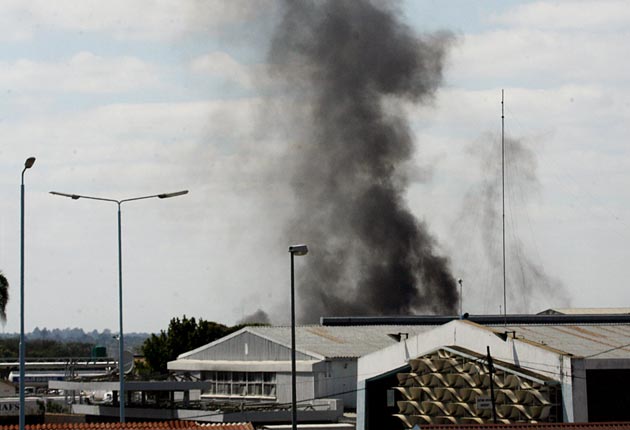Journalists are long used to taking the word of Zimbabwean authorities with than a generous pinch of salt. But as black smoke billowed over Harare airport yesterday and ambulances screeched towards it, the worst was expected.
"A 767 plane from London has had an accident at Harare airport," the head of Zimbabwe's Civil Aviation Authority told the press. "I can confirm there has been an accident, but I cannot give details right now."
Soldiers, paramilitary police and security agents sealed off all approaches to the airport and guarded the perimeter. Military helicopters hovered above the smoke. At the capital's Parirenyatwa hospital, distressed relatives gathered and extra medical staff were rushed in. All nervously waited for the arrival of casualties from the airport.
But as news of the disaster spread on the internet, the patients never appeared. As the smoke cleared, more details emerged. The "distressed relatives" had been "actors" and the entire situation a drill.
"Telling the media was part of the exercise," David Chawota, the Civil Aviation Authority chief, told a press conference. "We wanted to see how our media would react. All our systems worked perfectly. Police, security and hospital staff reacted swiftly."
The chief of the national carrier Air Zimbabwe, Peter Chikumba, said he had also been kept in the dark. He told the media that an emergency helpdesk had been set up for victims and their families.
Journalists who arrived at the scene saw smoke rising from a runway and were taken to a room where they were told to wait. The "accident" comes just over a year since the ban on foreign media was lifted.
The practice has been deployed elsewhere, attracting criticism every time. "Emergency drills are all well and good as part of regular safety procedures and operational awareness in the event of the real thing, but there is a danger of a 'cry wolf' syndrome if emergency drills are repeatedly confused with 'real-life' events," said Neil MacKinnon, global macro strategist at VTB Capital.
Gideon Ewers, of the International Federation of Airline Pilots Associations, was unable to think of a reason to mislead the public. "It's difficult to see what kind of benefit that would bring to a drill," he said.
Subscribe to Independent Premium to bookmark this article
Want to bookmark your favourite articles and stories to read or reference later? Start your Independent Premium subscription today.


Join our commenting forum
Join thought-provoking conversations, follow other Independent readers and see their replies